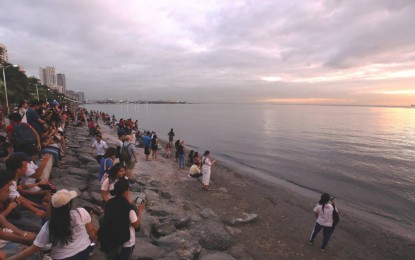
MANILA -- The Department of Science and Technology (DOST) officially launched on Friday the "IM4ManilaBay" (Integrated Mapping, Monitoring, Modelling, and Management System for Manila Bay and Linked Environments) program, which aims to help decision-makers in crafting policies in the rehabilitation of Manila Bay.
In an online interview with the Philippine News Agency (PNA), Executive Director Enrico Paringit, of DOST's Philippine Council for Industry, Energy and Emerging Technology Research and Development (PCIEERD), said the program already started last March 15 and would run for about two years.
"(Under this program), the water quality parameters related to domestic and industrial pollution will be monitored through satellite images. So we can have an indication of the effectiveness of interventions through this monitoring tool," he said.
Local government units would be able to access the data through a web platform. "That is where they could see (the data) because there would be an automated generation of maps on a periodic basis," Paringit said.
Other agencies such as the Department of Environment and Natural Resources, Department of Public Works and Highways, Department of the Interior and Local Government, the Philippine Coast Guard, and the Metropolitan Manila Development Authority are DOST partners in data gathering, as well as information management and dissemination, according to Paringit.
Some universities are also partners in terms of the capacity building via training techniques, he added.
Paringit said the DOST has allotted PHP40.6 million for the first year of implementation of the IM4ManilaBay program.
"DOST supports the R&D (research and development) part in the Manila Bay rehabilitation efforts. Most of the efforts are focused on actual clean-up," he added.
In a virtual presser, DOST Secretary Fortunato dela Peña remarked that the IM4ManilaBay program's launch coincided with the World Environment Day.
"Manila Bay is one of the most important natural resources in the Philippines because of its historical, cultural, and economic value. We support (the rehabilitation of) our natural resources," he said. (PNA)
In an online interview with the Philippine News Agency (PNA), Executive Director Enrico Paringit, of DOST's Philippine Council for Industry, Energy and Emerging Technology Research and Development (PCIEERD), said the program already started last March 15 and would run for about two years.
"(Under this program), the water quality parameters related to domestic and industrial pollution will be monitored through satellite images. So we can have an indication of the effectiveness of interventions through this monitoring tool," he said.
Local government units would be able to access the data through a web platform. "That is where they could see (the data) because there would be an automated generation of maps on a periodic basis," Paringit said.
Other agencies such as the Department of Environment and Natural Resources, Department of Public Works and Highways, Department of the Interior and Local Government, the Philippine Coast Guard, and the Metropolitan Manila Development Authority are DOST partners in data gathering, as well as information management and dissemination, according to Paringit.
Some universities are also partners in terms of the capacity building via training techniques, he added.
Paringit said the DOST has allotted PHP40.6 million for the first year of implementation of the IM4ManilaBay program.
"DOST supports the R&D (research and development) part in the Manila Bay rehabilitation efforts. Most of the efforts are focused on actual clean-up," he added.
In a virtual presser, DOST Secretary Fortunato dela Peña remarked that the IM4ManilaBay program's launch coincided with the World Environment Day.
"Manila Bay is one of the most important natural resources in the Philippines because of its historical, cultural, and economic value. We support (the rehabilitation of) our natural resources," he said. (PNA)
